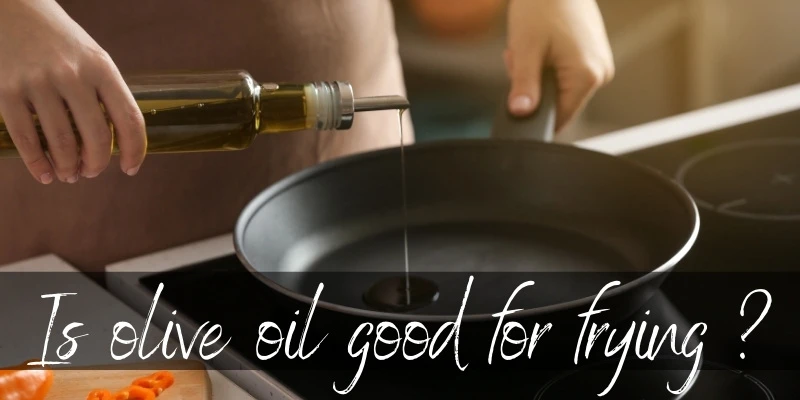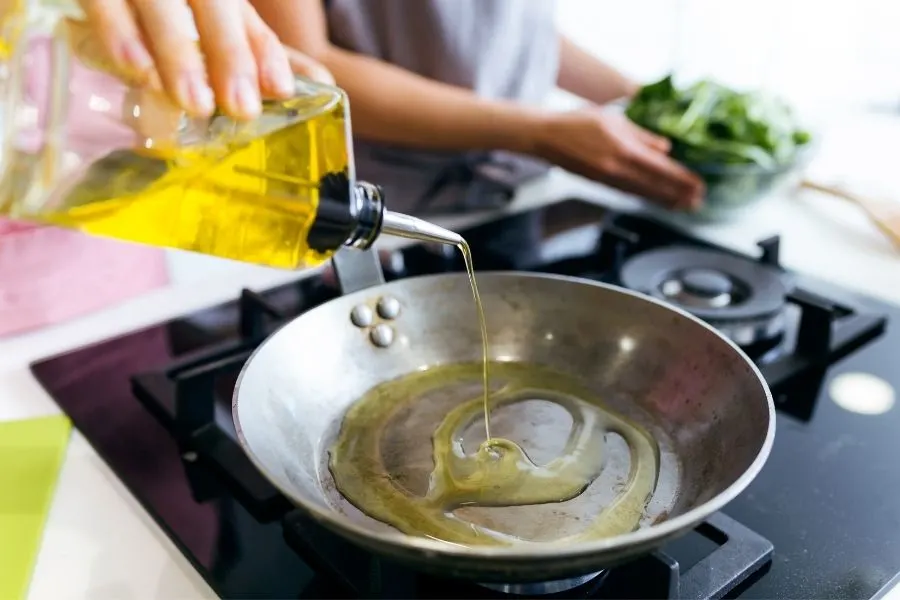Olive oil is a prized item in many kitchens, heavily used by many cooks. It has great flavor, a beautiful color, and a host of health benefits. You often see olive oil used to lightly fry something in a skillet, or as a salad dressing, or mixed into a vinaigrette or used as a dip. But you rarely, if ever, see it used to actually fry something.
So is olive oil good for frying ? Especially deep frying. If not, what kind of oil should you use ? And how else can you use olive oil ? Let’s take a look.

Is olive oil good for frying ?
Olive oil is only good for light sauteeing, not deep frying. Extra virgin olive oil has a low smoke point – 165 C/325 F – which means it can’t sustain high temperatures for a long time before it starts to smoke and burn. Smoking olive oil brings an acrid taste to whatever you’re cooking, and no one like that.
Olive oil has different grades, but extra virgin and virgin olive oils have the lowest smoke points. These are best used in cooking methods that don’t imply a lot of heat, or don’t require the oil to be hot for a long time. So virgin and extra virgin olive oil are not good for deep frying anything, nor for roasting meats, or even baking something.
Extra virgin and virgin olive oils
The reason virgin and extra virgin olive oils aren’t good with high temperatures is that their free acids – mostly represented by oleuropein – eventually burn and turn even more bitter. The actual fat in the oil turns into acrolein, a compound with a sharp, acrid smell and taste. It permeates your food and simply ruins the entire meal.
Read also: Why Is Olive Oil Virgin ?
This compound can appear when the olive oil is left in direct sunlight and mild heat for weeks at a time. The process is actually oxidation, leading to that dreaded rancid oil smell and taste.
There is an olive oil you can use for high temperatures, but it’s a lower grade one. It’s called refined olive oil (sometimes called pure olive oil) and it’s actually filtered through a chemical process. This means that most of the oleuropein and free acids are removed, but so is nearly all the flavor.
Why the smoke point matters
Different oils have different smoke points. Generally, the unrefined, ‘raw’ oils have a lower smoke point, like extra virgin olive oil and coconut oil and butter. They burn much faster and you can’t use them for just anything.
The higher the smoke point, the longer you can cook with the oil until it eventually turns acrid. Which is why you should have a back-up oil to deep fry and roast with, if your cooking style incorporates that.
This way you can use olive oil for most meals, and for meals where you need high heat you can use the heavy-duty oils. Let’s take a look at a few examples.
What oil is good for deep frying ?
Not all oils are good for deep frying or roasting, so here are the most common, easiest to find oils that you can use for your high-heat meals.
- Rice bran oil – 260 C/490 F
- Refined olive oil – 240 C/ 465 F
- Palm oil – 235 C/ 455 F
- Soybean oil – 230 C/450 F
- Sunflower oil – 225 C/ 440 F
- Canola oil – 205 C/ 400F
These oils are easily found on most supermarkets, meaning you won’t have a hard time picking up a bottle to use whenever you need a heavy-duty oil. These are also great to grill with, if you need a light coating of oil.

A word on the refined olive oil. You’ll notice it’s got the second highest smoke point on this list. his means you can safely bake, roast, and deep fry with it. But like any oil, it will eventually turn acrid, it will just take longer to do so.
If you decide to only use olive oil in your kitchen, and have a bottle of extra virgin and a bottle of refined, make sure they are clearly labeled. Maybe even colored differently, so you don’t use the extra virgin one for a roast.
How to store olive oil
When it comes to a good quality oil, such as extra virgin olive oil, you need to be sure you’re storing it properly. The steps you have to take a simple, very simple actually. But they need to always be respected.
You should store olive oil:
- away from direct sunlight, in the shade if possible
- away from direct heat
- at about 21 C/ 70 F (room temperature)
- in a well sealed bottle or container
If you happen to be incredibly lucky and have a whole tub of olive oil, Keep it somewhere cool, but not completely cold. Somewhere around 10-15 C/ 50-60 F, in the dark. Always use a colored glass bottle to store a small amount on the counter or somewhere you can easily reach it. And keep the bulk of the oil safe.
Stored properly olive oil should last about 24 months, once opened. Always trust your nose first. If it smells sour or just plain weird, don’t use it.
Tips on using olive oil
Whenever you are cooking with olive you, keep these tips in mind.
Always use virgin and extra virgin olive oil for light frying or sauteeing. Sweating onions, lightly fried eggs, seared halloumi, seared salmon are all great ways to use this delicious oil, without reaching its smoke point. The key here is the short cook time.
In pasta and soups, always add a couple of drops towards the end of the cooking process to give some extra flavor.
Use extra virgin olive oil to make your own flavored oil. Use fresh basil, rosemary, and crushed garlic in your oil, and let it sit for a couple of days. The result is a delicious mix of flavors that will go on anything you’re cooking.
Add a dash of extra virgin olive oil on baba ganoush, hummus, or any other similarly thick spread. Or, mix a bit of olive oil with balsamic vinegar and use it as a dip instead.
In short, olive oil is great for many things, especially mild cooking. If you’re using high heat be sure to use an oil with a high smoke point from the list we discussed earlier.

